Catheter Procedure Minimally Invasive for Ventricular Septal Defect (VSD) treatment
Treatment prices are regulated by national law of the corresponding countries, but can also include additional hospital coefficients. In order to receive the individual cost calculation, please send us the request and medical records.
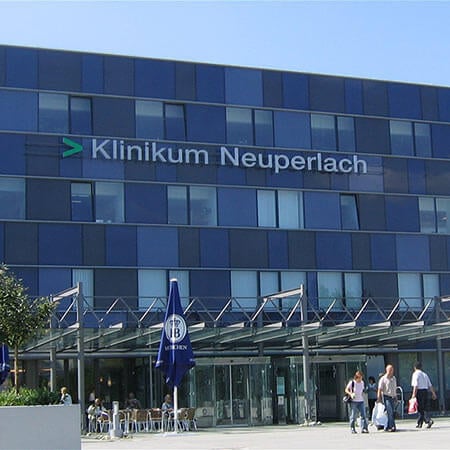
Department of Cardiology and Pulmonology
The Department of Cardiology and Pulmonology provides the full range of diagnostic and therapeutic services for patients with diseases of the cardiovascular system and lungs. In the field of cardiology, key attention is paid to the treatment of valvular heart disease, arrhythmias, heart failure, coronary artery disease, arterial hypertension and aortic diseases. The department's pulmonologists mostly deal with the treatment of pneumonia, bronchial asthma and chronic obstructive pulmonary disease. In addition, the department operates an Intensive Care Unit, within which patients can receive artificial ventilation, renal replacement therapy and procedures for maintenance of blood flow. The department's Chest Pain Unit is certified by the German Cardiac Society and provides medical care to patients with acute coronary syndrome. The department successfully uses in its clinical practice both proven classical treatments and innovative medical achievements, which are available only in leading European hospitals. The department's medical team provides treatment to more than 3,200 patients every year.


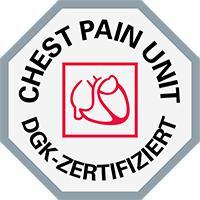
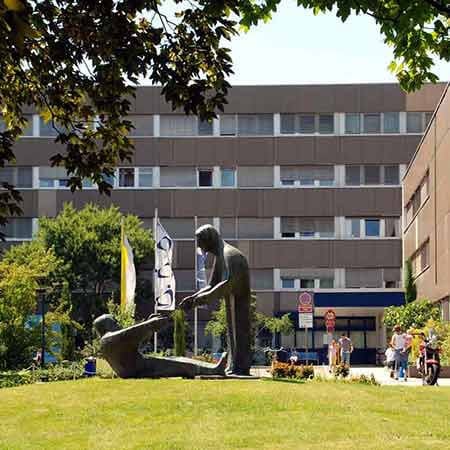
Department of Cardiology and Angiology
The Department of Cardiology and Angiology offers the full range of medical services in the fields of its competence. The department's doctors specialize in the treatment of congenital and acquired heart defects. The key focus is on catheter-based heart interventions, which are characterized by a minimal trauma rate and allow patients to avoid an open operation. For this purpose, the department has three modern Cardiac Catheterization Laboratories. The department also houses an Intensive Care Unit and a Chest Pain Unit for patients with acute coronary syndrome. The medical facility has 82 beds. The department was awarded the prestigious quality certificate from the German Cardiac Society (DGK) for outstanding results in the treatment of mitral valve diseases and acute coronary syndrome. Another important area of work of the department's physicians is comprehensive heart examinations for the prevention of heart disease. For this purpose, specialized Check Up Programs have been developed here, which include an optimal set of diagnostic tests. The medical facility employs a highly professional team of doctors and nursing staff, which makes every effort to provide each patient with effective medical care in a pleasant and comfortable atmosphere.
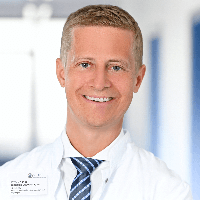

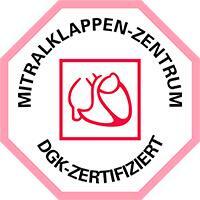
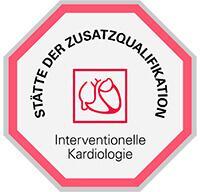


Department of Cardiology and Angiology
The Department of Cardiology and Angiology offers the full range of medical services in the areas of its specialization. The medical facility holds consultations and carries out the diagnostics and treatment of diseases of the heart and blood vessels. The department's team of cardiologists focuses on patients with valvular heart disease, heart rhythm disturbances, coronary artery disease, heart failure, and congenital heart disease. The department has a Chest Pain Unit certified by the German Cardiac Society (DGK) for the treatment of acute coronary syndrome. In the field of angiology, of key interest is the treatment of peripheral arterial occlusive disease, vascular stenosis of various locations, including carotid artery stenosis, and deep vein thrombosis. During the treatment of diseases of the heart and blood vessels, the department’s specialists use various drug therapy regimens and perform image-guided interventional procedures. The medical facility has been recognized with quality certificates for transcatheter aortic valve implantation (TAVI) and treatment of heart failure and mitral valve disease. Patients are treated by highly qualified physicians who strive to restore the patient's health using sparing treatment methods.
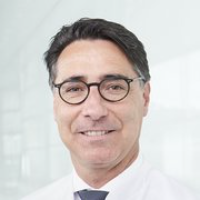





A ventricular septal defect (VSD) can be treated with open surgery or a minimally invasive endovascular procedure. In recent years, the transcatheter procedure has become increasingly common in developed countries. It is technically more complex and requires special equipment and skills. This procedure, however, is safer than traumatic surgery with a chest incision and, with a proper selection of patients, provides comparable results with a low risk of complications. If you want to undergo your minimally invasive treatment abroad, you should use the Booking Health service. On our website, you can find the best hospitals in the world and see the cost of treatment.
Content
- Who may need treatment for a ventricular septal defect (VSD)?
- Who may be a candidate for minimally invasive ventricular septal defect (VSD) treatment?
- How is a transcatheter procedure for a ventricular septal defect (VSD) performed?
- Results of minimally invasive surgery for a ventricular septal defect (VSD)
- Where to undergo your treatment for a ventricular septal defect (VSD)?
Who may need treatment for a ventricular septal defect (VSD)?
A ventricular septal defect (VSD) is a common congenital cyanotic heart disease. It is the second most common heart defect after an atrial septal defect.
The defect is a hole between the ventricles of the heart, which normally should not be there. As a result of this development, blood is discharged from the left half of the heart to the right, overloading the right ventricle with volume. Patients with a ventricular septal defect (VSD) eventually develop right heart dilatation and heart failure. Other complications may include arrhythmias, pulmonary hypertension, lung infections, and strokes. Timely surgery can prevent these complications.
At the same time, not all types of heart disease are dangerous, so not all patients need surgery. Minor ventricular septal defects (VSD) can close on their own, and even if they persist, they do not significantly affect hemodynamics. Therefore, indications for the surgical treatment of this heart disease are the following:
- left ventricular dysfunction;
- progressive aortic insufficiency;
- previous endocarditis;
- the presence of symptoms;
- Qp/Qs (the ratio of pulmonary to systemic blood flow) is 2 or more;
- Qp/Qs is greater than 1.5 if pulmonary artery pressure and vascular resistance are less than two-thirds of systemic pressure.
Who may be a candidate for minimally invasive ventricular septal defect (VSD) treatment?
In heart surgery, minimally invasive surgeries and procedures are becoming more common. Doctors successfully close ventricular or atrial septal defects from inside the blood vessels, place stents in a heart artery, or perform transcatheter heart valve replacement.
In some areas of cardiac surgery, transcatheter techniques are considered an alternative to open surgery, which is used only in patients at high surgical risk. However, there are also diseases in which endovascular procedures have become the main ones and have largely replaced open surgery. For example, this is a transcatheter aortic valve replacement or an atrial septal defect (VSD) closure.
At the same time, the closure of the ventricular septum by the percutaneous method using a catheter is still not always used. Open operations are performed more often. It is possible to close muscle defects of the septum using minimally invasive techniques, while doing so with perimembranous defects is uncommon. Many ventricular septal defects (VSD) are located too close to the heart valves, making a percutaneous procedure complex.
How is a transcatheter procedure for a ventricular septal defect (VSD) performed?
A percutaneous intervention is an X-ray-guided surgical procedure that is performed from inside the blood vessels. Doctors only need to make a small incision in the groin and insert a catheter through it to approach the heart. X-ray guidance is used during the movement of the catheter through the blood vessels.
Once they reach the heart, doctors use an occluder to close the defect. The occluder is inserted into the hole and fixed to the septum of the heart. The occluder usually closes the gap between the ventricles completely. A small residual defect may remain, but it is usually too small to significantly affect hemodynamics.
Results of minimally invasive surgery for a ventricular septal defect (VSD)
The results of a ventricular septal defect (VSD) closure with a catheter are no worse than in open-heart surgery. The procedure allows for the cure of heart disease once and for all, achieving complete normalization of hemodynamics and remodeling of the heart.
A day after the minimally invasive procedure, there is a decrease in the size of the dilated heart cavities. The volume and contractility of the left ventricle increase gradually. These processes proceed faster than after open-heart surgery. The earlier the intervention is carried out, the better the final results.
At the same time, the minimally invasive method is safer compared to open surgery. The insertion of a catheter through the blood vessels does not require any significant surgical trauma. After such an intervention, the recovery time is minimal. The risk of severe complications is very low. Only a small number of patients may develop atrioventricular block, which is more often a consequence of the closure of perimembranous septal defects of the heart.
The safest procedure is to close muscle defects because the risk of complications is calculated in tenths of a percent. When closing perimembranous defects, the risks are higher and reach 5%. However, in most cases, the transcatheter procedure is safer than open surgery.
Where to undergo your treatment for a ventricular septal defect (VSD)?
If you require any endovascular procedures for the treatment of heart disease, such as a transcatheter heart valve replacement or a ventricular septal defect (VSD) closure, you can have your treatment abroad. The world's best hospitals admit foreign patients. They have state-of-the-art equipment and employ top-class doctors with vast experience in minimally invasive operations to close septal defects.
You can make an appointment for your treatment abroad using the Booking Health service. On our website, you can find out the cost of treatment for a ventricular septal defect (VSD) and compare prices at different hospitals. When you make an appointment through Booking Health, the cost of treatment will be lower. The price will be reduced due to the absence of increased taxes for foreign patients.
The Booking Health specialists will arrange your trip to a foreign country. We will contact the hospital administration and make an appointment on your preferred dates, translate your medical records, and book the nearest hotel and airline tickets. We will also meet you at the airport, take you to the hospital by car, and provide interpreting services. After the completion of your treatment, we will take care of your return transfer to the airport.
You will receive support and assistance in solving any organizational issues during the entire period of your stay abroad. Upon the completion of your treatment, you will be able to receive medical consultations within 3 months. If necessary, we will buy and forward medicines to your native country. All these and many other issues will be successfully resolved if you use the services of the medical tourism agency Booking Health.
Authors:
The article was edited by medical experts, board-certified doctors Dr. Nadezhda Ivanisova and Dr. Vadim Zhiliuk. For the treatment of the conditions referred to in the article, you must consult a doctor; the information in the article is not intended for self-medication!
Sources:
ECR - European Cardiology Review

